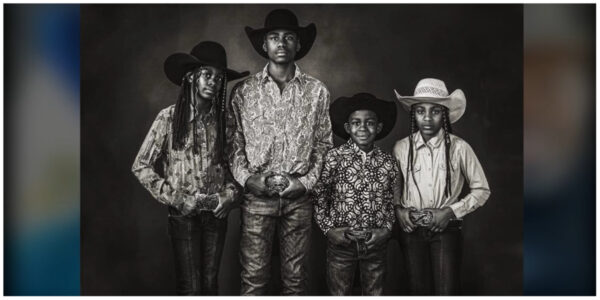‘It’s a Lifestyle We Enjoy’: Family Full of Rodeo Champions Adopts Black Cowboy Culture
“It’s a lifestyle that we enjoy,” said Corey Jackson, the patriarch of a fifth-generation cowboy family out of Maryland that has adopted rodeo culture into their way of life.
Cowboy culture is a way of life not many African-Americans are very familiar with, but for the Jackson family from Marlboro, Maryland, the rodeo lifestyle is filled with year-round training for bull riding, tie-down roping, pole bending and horseback riding competitions.
“My wife and I met independent of one another in horses, so horses were the common denominator that brought us together,” Corey Jackson said about meeting his wife.
Corey Jackson, 46, grew up in Winston-Salem, North Carolina. He says he has always been fascinated with cowboys. He loved watching Westerns on television with his grandfather and going to events where he knew horses and other livestock would be on hand.
“I’ve always loved the outdoors, so being outside, being outdoors, being a cowboy, working cattle, I loved animals,” Corey Jackson said.
While Jackson did not grow up on a farm or have direct access to horses or other livestock growing up, he says his parents supported his interest in cowboys. “They would support my interest with taking me to a few annual horse events throughout the year so that’s how I got my horse fix,” Jackson said.
Jackson says it wasn’t until he turned 25 that he got a horse of his own. Meanwhile, his wife, Robyn, who is from Upper Marlboro, Maryland, has a family history intertwined with farming and livestock.
“My wife’s side of the family, she’s a fourth-generation cowgirl, and Nick and his siblings are fifth generation. This goes all the way back to sharecropping; they were really good at training horses and mules,” Jackson said.
Jackson told the Washington Post he and Robyn met at the Bill Pickett Invitational Rodeo two decades ago. The two started dating and, years later, raised a family of five children, all growing up and interested in cowboy activities.
Jackson says their mutual love of horses helped bring them together. Jackson works in international security and intelligence, and Robyn is a homemaker and educates the kids. The family owns a 10-acre ranch with several horses, bulls, goats, and other animals on their property.
“On any given time, we usually have anywhere from 26 to 18 large animals on the ranch,” Corey Jackson said.
The children are all homeschooled by their mother. After their daily homeschooling, the children typically turn their attention to honing their rodeo skills.
“We try to practice every day, and so everyday work is usually me riding my mom’s horse ‘bareback,’ which basically is balance and fast-twitch muscles, and my dad helps me when I’m on the bucking dummy, which is a simulator of the up and down motion of a bull,” said Nicholas Jackson.
Although their oldest child, Robert, 15, does not compete due to a medical condition, he is an avid fan of rodeos; however, the other children do compete against other children from around the world within their respective age groups. Corey Jackson says they travel across the country several times yearly for competitions. Nicholas, 14, was named the 2020 Junior World Bull Riding Champion.
“As I was little, I always liked riding sheep at the local rodeos, and my favorite part was always watching bull riding. That was the event that interested me the most,” Nicholas Jackson said.
Twelve-year-old twins Reagan and Ryan also compete in roping and pole bending competitions.
“With Nicholas’ success, they see it right in front of them, and they see it as a really big motivator to have greatness in front of you, and not only in front of you and you see the accolades, but you see the grind, you see the behind the scenes you see the work,” Corey Jackson said.
The youngest of the family, Dylan, 9, also competes.
“At just 9 years old, he rides bulls, and he wants to follow in his big brother’s footsteps,” Corey Jackson said.
According to the Professional Rodeo Cowboys Association, roughly 11 percent of rodeo competitors are Black, while 68 percent are white and 21 percent are Hispanic. Many rodeo competitors also enjoy hunting and fishing, as do the Jacksons.
Corey Jackson says trailblazing Black cowboys of the past are inspirations to him and his family.
These cowboys include Nate Love, a former enslaved man from Tennessee who went on to become a cowboy in the American West; Bill Pickett, who invented a form of steer wrestling called bulldogging; and Jesse Stahl, also from Tennessee, who invented the “hoolihanding” technique where a bull is wrestled to the ground after jumping onto its back from a horse, according to the National Cowboy Museum.
All of the aforementioned men paved a pathway for future generations of Black cowboys and cowgirls during the late 1800s and into the early 1900s.
“Those are the forefathers. Those are the trailblazers. Those were during that time frame, they were instrumental in American history as it pertains to the settlement of the American West,” Corey Jackson said.
At the time of the interview with Atlanta Black Star, 14-year-old Nicholas and his dad had just landed in Las Vegas from Maryland to compete in this year’s junior world finals for bull riding. Although the grand prize is typically a few thousand dollars, Nick says the most rewarding part of competing is seeing all the countless hours of practicing pay off on the world stage.
“The work you put in behind the scenes shows when you’re on the big stage, and you get to put it all together. I think that’s the most rewarding part of it,” Nicholas said.
“We do it for pleasure because it’s something we love doing, but it’s a lifestyle that we enjoy,” Corey Jackson said of his family’s continued legacy of embracing cowboy culture and rodeo competitions.

